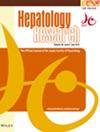Favorable impact of hepatitis C virus infection control on recurrence after surgical resection for intrahepatic cholangiocarcinoma
Abstract
Aim
Hepatitis C virus (HCV) infection is a risk factor of intrahepatic cholangiocarcinoma (ICC). However, the impact of HCV infection control status on prognosis after surgery for ICCs is still unclear.
Methods
This multicenter retrospective study included patients who underwent curative resection for ICCs. The sera of 56 patients tested positive for anti-HCV antibody and negative for hepatitis B surface antigen (HCV group). Additionally, the sera of 358 patients tested negative for anti-HCV antibody and hepatitis B surface antigen (NBNC group). In the HCV group, 33 of 56 patients achieved sustained virologic response (SVR) for HCV (SVR group), whereas 23 patients did not (non-SVR group). To investigate the prognostic impact of HCV infection control status in the whole study cohort and in patients with solitary ICC without lymph node metastasis (StN0 study cohort), the postoperative prognosis of the SVR, non-SVR, and NBNC groups was compared.
Results
In the whole study cohort, there were no significant differences in terms of recurrence-free survival (RFS) or overall survival among the three groups. Based on the multivariate Cox regression analysis, non-SVR was an independent unfavorable prognostic factor of RFS. In the StN0 study cohort, the non-SVR group had a significantly lower RFS than the NBNC and SVR groups. Based on the multivariate analysis, non-SVR was an independent unfavorable prognostic factor of RFS.
Conclusions
The achievement of SVR for HCV infection in patients with HCV infection-related ICCs is associated with a better RFS after surgery for HCV-related ICCs, particularly solitary ICC without lymph node metastasis.


 求助内容:
求助内容: 应助结果提醒方式:
应助结果提醒方式:


